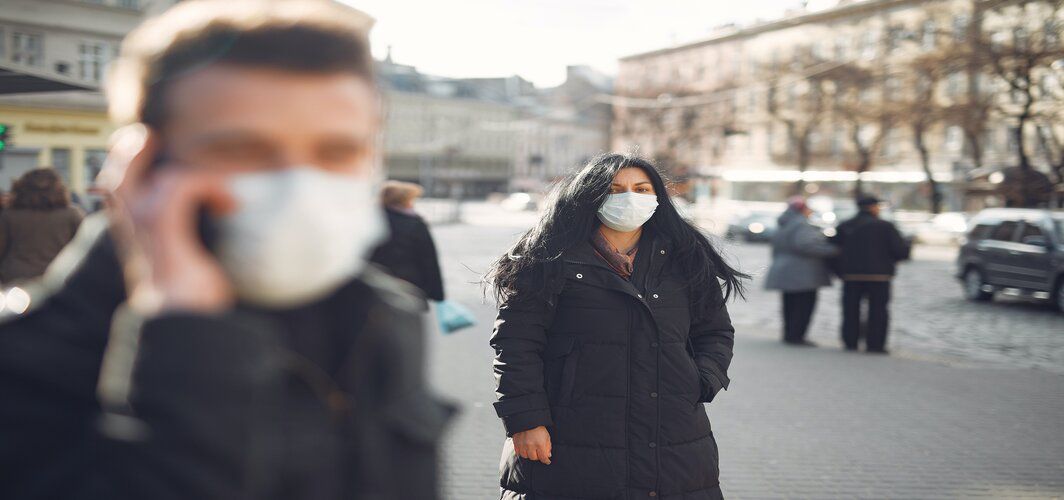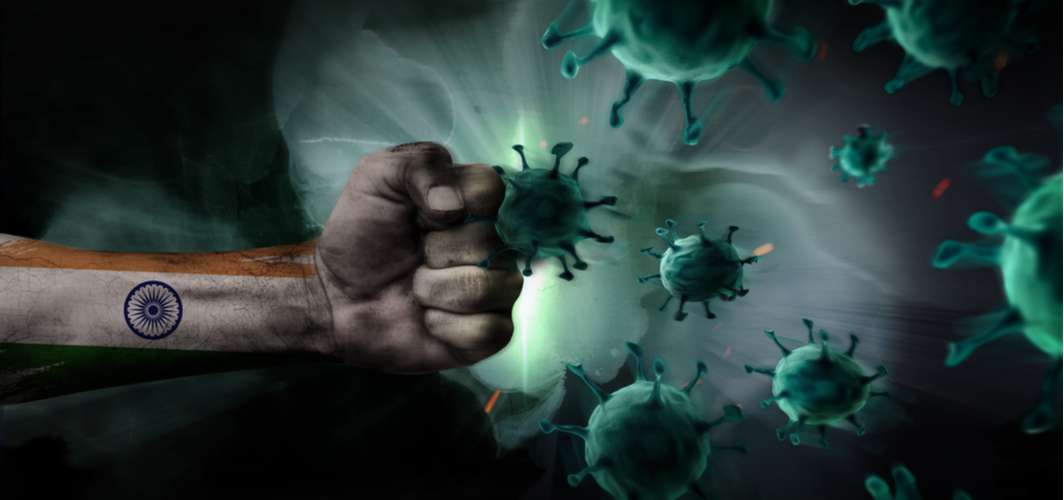Coronavirus Updates
PCOS and Severe COVID-19: Is There a Link?
5 min read
By Apollo 24/7, Published on - 24 March 2021, Updated on - 11 November 2022
Share this article
0
5 likes

It has been more than a year since the novel coronavirus, the virus causing COVID-19, was first discovered. Though most cases of COVID-19 are mild, some pre-existing health conditions increase the severity of the disease. Clinical evidence indicates that older adults and those suffering from metabolic diseases such as diabetes, obesity, and hypertension are most likely to suffer from severe COVID-19. However, recent research suggests that women suffering from PCOS are also at risk of developing severe symptoms of COVID-19.
What is PCOS?
Polycystic ovary syndrome, popularly known as PCOS, is a medical condition where the ovaries start producing an abnormal amount of androgens (male sex hormones), which are normally present in small amounts in women. As the name suggests, the affected women may (or may not) develop small fluid-filled sacs (cysts) in their ovaries. Women with PCOS often complain about irregular periods, thinning of hair, weight gain, difficulty in getting pregnant, and acne.
Why are women with PCOS at increased risk of developing severe COVID-19?
Research published in The Journal of Steroid Biochemistry and Molecular Biology in January 2021 and BMC Medicine in July 2020 have concluded that some characteristics found in women suffering from PCOS may increase their risk of developing severe COVID-19 illness. Some of these risk factors include:
-
Obesity
On 27th March 2020, scientists from the Intensive Care National Audit & Research Centre, UK, reported in their study that out of the 3883 COVID-confirmed patients, 73.2 % were obese or overweight and required intensive care. They further reported that among the obese patients who required intensive care, 54% of them died. Since most women suffering from PCOS are overweight or obese, they are at risk of developing severe symptoms of COVID-19.
-
Increased risk of type-2 diabetes
A meta-analysis published in the journal Diabetes Care in 2019 stated that women diagnosed with PCOS are at increased risk of suffering from type 2 diabetes irrespective of their age body mass index. Since diabetes is already a risk factor, women suffering from PCOS can be at increased risk for severe COVID-19.
-
Increased inflammation
When the body is attacked by any foreign microorganism (like the COVID-19 virus), the immune system releases immune cells such as cytokines to fight the infection. However, when these cells are released in excess amount, they cause inflammation. After conducting several studies, scientists have confirmed that cytokine storm and the release of inflammatory immune cells such as TNF-α (tumour necrosis factor-α) and interleukins at the site of lung tissue infection results in hyper-inflammation, respiratory failure and even multi-organ failure in COVID-19 patients.
Studies have also shown that women suffering from PCOS and obesity exhibit increased release of leptin (hunger hormone), TNF-α and Interleukin-6 (IL-6) which puts them in a chronic pro-inflammatory state. This increases their risk of suffering from severe symptoms of COVID-19 if they contract the virus.
-
Increased androgens (male sex hormone)
In a recent study, scientists found that men who were admitted to the hospital due to severe COVID-19 infection suffered from male pattern baldness, which indicated the role of androgens in COVID-19 severity. Since women suffering from PCOS exhibit hyperandrogenism (increased levels of androgens in the body), they can be prone to severe COVID-19 infection.
-
Low levels of vitamin D
It is a well-known fact that vitamin D helps in modulating the acquired and immune responses of the body. Therefore, it can regulate the activity of IL-6 and suppress the pro-inflammatory cytokine response. Studies have shown the association between vitamin D deficiency with increased hospitalization due to severe COVID-19 infection.
Since women diagnosed with PCOS develop vitamin D deficiency, their risk of suffering from severe COVID-19 increases. Scientists also believe that due to COVID-19-related quarantine measures, the vitamin D levels in the body of the general population have reduced significantly.
-
Imbalanced gut microbes
Research has shown that women suffering from PCOS develop an imbalance in the microorganisms present in their gut (dysbiosis). These women have reduced alpha diversity and increased beta diversity of gut microorganisms. Low alpha diversity of gut microbiota can result in chronic low-grade inflammation, which can exacerbate if the woman gets exposed to the COVID-19 virus.
Furthermore, dysbiosis in PCOS can also cause abnormal glucose metabolism and hyperandrogenism, which further increases the risk of developing severe complications of COVID-19.
What can be done to prevent severe COVID-19 in women with PCOS?
The exact correlation between PCOS and COVID-19 has not been understood yet. However, it is important to pay special attention to the women with PCOS who test positive for COVID-19, due to overlapping risk factors.
Meanwhile, women with PCOS can manage their health better by:
- Consuming a healthy diet with at least 5 portions of fruits and vegetables and whole foods.
- Exercising regularly to maintain a healthy weight as studies reveal that losing even 5% of their current body weight would help manage PCOS better.
- Consuming vitamin D rich foods such as oily fish (like salmon and mackerel), organ meat (liver), egg yolks and fortified breakfast cereals. Supplements can also be taken after consulting a physician.
- Regularly taking prescribed medications such as contraceptive pills for irregular periods and metformin for controlling high blood sugar.
Conclusion
More studies are needed to be conducted to examine the exact relationship between conditions such as PCOS that may significantly increase the risk for severe COVID-19-related outcomes. In the meantime, one must continue to strictly follow social distancing norms, wash their hands frequently, and wear a mask to reduce the spread of COVID-19.
The Indian government has announced that from 1st April 2021, COVID-19 vaccines would be available for everyone above the age of 45 years, irrespective of their medical history. People included in these groups must register themselves to get vaccinated at the earliest.
Apollo is offering vaccinations for the specified groups at low, government-approved prices.
Apollo’s 24|7 app offers a spectrum of vaccination services. Customers can use it to book and schedule a COVID-19 vaccination in 3 easy steps. The app also provides virtual consultation with a speciality doctor, for matters relating to PCOS and other hormonal disorders.
Coronavirus Updates
Leave Comment
Recommended for you

Coronavirus Updates
Coronavirus airborne transmission: The latest update
The latest scientific brief released by the CDC states that airborne transmission of the Coronavirus is possible under certain circumstances.

Coronavirus Updates
What Is Proning and How Does It Help COVID-19 Patients Breathe Better?
The Ministry of Health and Family Welfare (MoHFW) has issued clinical guidance on proning, a medicaly accepted position that can help improve breathing and oxygenation in COVID-19 patients.

Coronavirus Updates
What are the Long-Term Health Effects of COVID-19?
It has been found that the after-effects of the COVID-19 linger on in the form of fatigue, heart issues, joint pains, neurological symptoms and other problems.
Subscribe
Sign up for our free Health Library Daily Newsletter
Get doctor-approved health tips, news, and more.
Visual Stories

Can India Beat the COVID-19 Surge?
Tap to continue exploring
Recommended for you

Coronavirus Updates
Coronavirus airborne transmission: The latest update
The latest scientific brief released by the CDC states that airborne transmission of the Coronavirus is possible under certain circumstances.

Coronavirus Updates
What Is Proning and How Does It Help COVID-19 Patients Breathe Better?
The Ministry of Health and Family Welfare (MoHFW) has issued clinical guidance on proning, a medicaly accepted position that can help improve breathing and oxygenation in COVID-19 patients.

Coronavirus Updates
What are the Long-Term Health Effects of COVID-19?
It has been found that the after-effects of the COVID-19 linger on in the form of fatigue, heart issues, joint pains, neurological symptoms and other problems.